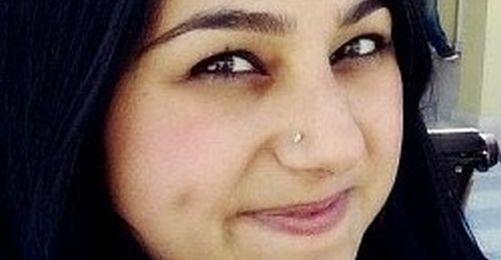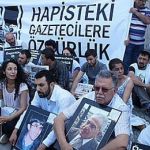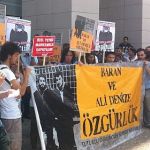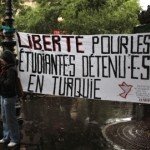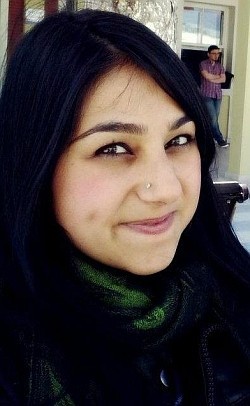
"I was snatched away from home in the company of [security officials] bearing rifles. I have been under arrest for two and a half months without knowing why..."
Thus begins the letter penned by Ezgi Özgün to bianet, a junior student at Dumlupınar University's Department of Public Administration.
Officials took Özgün under custody on May 9 during a raid into her home in connection with a security operation against the Revolutionary People's Liberation Party-Front (DHKP-C.) No one ever told her why, and she was arrested two days later.
She has remained behind bars at the Sincan Women's Prison since then.
With an order of secrecy over her file and no formal indictment prepared against her yet, Özgün and her lawyer Evrim Deniz Karatana are left in the dark as to the exact nature of the charges leveled against her. "Making propaganda for a terrorist organization" is their guess.
Officials asked Özgün a number of questions at the Ankara Prosecutor's Office during her interrogation, including the following:
* "You have issued a press statement demanding free education. Who is exactly making this demand?"
* "Are you attending the panels at the Education and Science Workers' Union (Eğitim-Sen?)"
* "Did you attend the May 1st demonstrations in Taksim Square (in Istanbul) in 2011?
* "Did you participate in the demonstrations in the town of Kürecik in [the eastern province of] Malatya against the [U.S.] missile shield [radar there?]"
"These are the reasons that led to my arrest, even though it is absurd enough to recognize demands for free education as an offense and question [me] about this," Özgün said.
"Since when does it constitute a crime to exercise a constitutional right? I am a student of public administration. It was the schools and academics of this state which taught me about constitutional rights, the equality of laws and that formal charges require evidence [to back them up] throughout my three years of education," she added.
"Do we need to have arresting stories to be vindicated?"
Law enforcement officials had also arrested 21 year old French citizen Sevil Sevimli on the allegation that she was a member of the DHKP-C on May 10, after she had arrived in the northwestern province of Eskişehir as part of the Erasmus student exchange program. She was subsequently released, however, within the scope of the Third Judicial Package ratified on July 5.
"I am only one of thousands of arrested students," Özgün said, adding that public pressure had played a significant role in Sevimli's release.
"This is exactly what [daily Radikal columnist] Pınar Öğünç was talking about in her article entitled 'What if Sevil was not a French citizen?' on Aug. 10," she said.
"The stories of some students are not like this at all. The public literally expects [to see] an arresting story to claim [the case of an arrested student.] As if this were a popstar competition," Özgün quoted Öğünç's article.
"Apparently, it does not seem sufficiently striking that [the authorities] depict even our act of inhalation as a crime. Is it not remarkable that [officials] are filling boxes lined up in queues for trials with our lives and even regard our class books as [terrorist] propaganda? Do we need to have arresting stories to be vindicated?" she asked.
"This is neither a contest, nor is what [we are going through] fiction. We are the thousands of students whose lives have been stolen," Özgün added.
Özgün also highlighted the fact that Sevil was released, not acquitted.
"No one questions whether [voicing] these demands constitute a crime or [bother to] expose our state of arrest. No one asks whether someone could be arrested on such grounds. No one questions the fact that the court delegation overseeing the same trial rejected our demands [to be released within the scope of the Third Judicial Package] and that even our court dates are uncertain despite the fact that we were arrested in the same operation in connection with the same accusations [as Sevimli.] No one [bothers to] lay bare the inconsistency in the two cases. After all, there is no equality or universality in the law, is there?" Özgün said.
Saved by a doctor
Özgün also noted that she had fallen ill while in prison and could only heal through the efforts of one doctor.
The prison administration refused to give her medication after she exhibited an allergic reaction on Aug. 14. Her illness then began to advance on Aug. 20, and she had difficulty breathing.
The prison doctor who learned that she still had not received her medication consequently said she could die, and threatened to write an official notice unless she was administered her drugs.
"What if that doctor was not around?" Özgün asks. (AS)





